   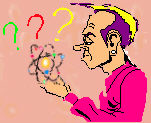  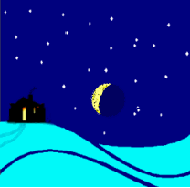 |
|
Vandana Shiva |
Meriam Webster Dictionary |
      |
|
|
|
|
|||
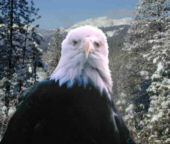 A human sunbather basks in the sun on a hot, late afternoon. Every day that week, after work, from 6 to 7 pm, she lay in the hot sun with no effect whatever. Then, right after lunch on Saturday, she sunbathed for 15 minutes and got a bad sunburn. The bird watching from her nest high in a tree knew something the sunbather needed to know, but would have had great difficulty understanding, even if the bird could chirp in fluent English. The bird sees color that
includes ultraviolet detection--and also has "dimension" greater than the
human's paltry three. As the sun drops toward the horizon it's color
(to a bird) shifts from ultraviolet toward red. The difference between
noonlight and late-afternoonlight is as distinguishable (to the bird) as
is the difference between green and orange to a human being.
|
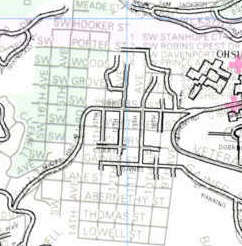
A correct map (dark) superimposed over a creative map (dim). That grid of streets shows on many (most?) street maps of Portland. "That's a good map," said a city planner. "It shows the dedicated streets that a city planner needs to know about." "But almost all the people who try to use this map are trying to get from one place to another," I replied. "All those non-existent streets make the map useless for those people." "It's a good map." And a fourth-grader added,
"It's a good map; I found all the street names my teacher told to find."
|

"If I buy the winning ticket, I'll be set for life." 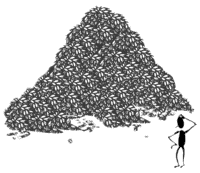 "But "But"So, I'll keep trying. Eventually I'll win." "The more times you play, the closer to exactly 45% of all the money you put down for tickets will be what you lost. The Lottery Board already set your losses. They can do that because they understand the statistics." "Statistics is a tool of
liars; I'll keep on playing!"
|
|
|
|
|||
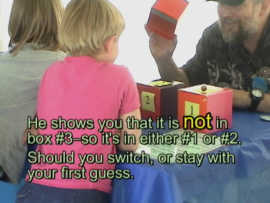 Marilyn vos Savant presented
this puzzle in her weekly Parade column, and explained why the chooser
should switch. Many professional mathematicians wrote back saying
that she was wrong; in fact, more said she was wrong than said she was
right. However, one university Math Department head wrote, on seeing
the math community's responses, "Math's not a democracy: she's right!"
|
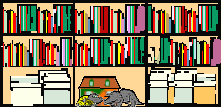 . Feynman was the only evaluator diligent enough to discover that one of the textbooks had all blank pages between the covers. As he read through the books, his wife complained that he repeatedly burst into shouts, "erupting like a volcano." ALL of the books were UNIVERSALLY LOUSY.
Surely You're Joking
Mr. Feynman, pp 262-276
In 2002, John Hubisz reported
that in a study of all the middle-school physical science texts, "Not
one of the books we reviewed reached a level that we could call 'scientifically
accurate'..." In Physics Today (May
2003) he wrote, "Thousands
of teachers are saddled with error-filled physical science textbooks that
fail to present what science is all about..."
. All the publishers of those books had been sent letters asking for their participation in the study. Not one of them replied.
|
|
"We
can, and we've got to, do better than this."
Theodore Seuss Geisel |
|
|
Here are some tantalizing tidbits to follow further:
| Why the similarity between the words "theater" and "theory"? | Everyone who uses "theory" to mean "guess" or "stab in the dark," when the word refers to a scientific theory, is displaying a glittering aura that says, to everyone who isn't in the dark, that he (or she) is in the dark about science. | ||
| "...we have no knowledge of what energy is." | Feynman said that. There's a ton of magic in that statement, and everyone who makes decisions about energy needs at least a little of that magic. | ||
| "...sooner or later you will need to use tensors." | Feynman said that, too. There are at least two tons of magic in that statement. | ||

Protanopic color is represented by the red lines.
|
|
||
 . . . . |
What are the dimensionalities of the colors in the three pictures? | ||
 |
The tulip is black to a
human being, but to a bird it might appear brilliantly colored. If
the tulip reflects a lot of ultraviolet, it will.
If a bird tried to explain the tulip's color to a human being he (or she) would be just tilting at windmills. Views of our surroundings from different eyes in different heads might differ more than we can understand. |
| Don Quixote, Sancho Panza and the bird: Who sees things of the real world? Who sees a world only of his own mind? Who sees things neither of the others sees? |
 |
From the high saddle of our horse: Do we see more than does the man on the ground? More than from the high view of the bird? How can we explain to others what we see? |
.